Thursday, June 6, 2024. Annette’s News Roundup.
I think the Roundup makes people feel not so alone.
To read an article excerpted in this Roundup, click on its blue title. Each “blue” article is hyperlinked so you can read the whole f.
Please feel free to share.
Invite at least one other person to subscribe today! Here 👇 is the link to share for others to subscribe. https://buttondown.email/AnnettesNewsRoundup
Remember: when you share the Roundup, you are fighting Fascism and helping to bring about a Democratic victory in 2024.
_________________________________________________
Joe is always busy.
Yesterday, Senate Republicans blocked a bill making contraception a federal right.
Republican elected officials’ extreme agenda continues to undermine access to reproductive health care.
— President Biden (@POTUS) June 5, 2024
It's at odds with the majority of Americans.
And it's unacceptable.
My statement on Senate Republicans blocking efforts to safeguard nationwide access to contraception: pic.twitter.com/UT8RqPcIkI
The anti-contraception crowd continues to lie.
BREAKING: Every one of Donald Trump’s potential Vice Presidential candidates voted against protecting the right to contraception. Donald Trump himself also said he would sign a national abortion ban if reelected. Don’t tell me President Biden and Donald Trump are the same.
— Biden’s Wins (@BidensWins) June 5, 2024

Republicans are coming to take contraception away from the vast majority of Americans because extremists don’t believe in birth control — they believe in controlling women. That’s why millions of voters are saying #HandsOffMyBirthControl!-NP pic.twitter.com/VLtIeaMRYL
— Nancy Pelosi (@TeamPelosi) June 5, 2024
All nine Republican senators running for reelection this year just voted against the right to contraception:
— Robert Reich (@RBReich) June 5, 2024
John Barrasso
Marsha Blackburn
Kevin Cramer
Ted Cruz
Deb Fischer
Josh Hawley
Pete Ricketts
Rick Scott
Roger Wicker
So much for the party of "freedom."
— - -
The Time Magazine Interview. Part I today.
President Biden on World Leadership, War, and 2024 Election | TIME
‘We Are the World Power.’ How Joe Biden Leads.
22 MINUTE READ
You can read the transcript of the interview here and the fact-check here.
Joe Biden makes his way through the West Wing telling stories. In the Cabinet Room, with sun pouring through French doors from the Rose Garden outside, he remembers the first time he sat around the long mahogany table, its high-backed leather chairs ordered by seniority. It was more than 50 years ago, Biden says, and Richard Nixon told National Security Adviser Henry Kissinger to brief the 30-year-old first-term Delaware Senator on the still secret timing of the U.S. withdrawal from Vietnam. Walking slowly through the halls, the President unspools anecdotes about heads of state: Vladimir Putin, Xi Jinping, Emmanuel Macron. In the Oval Office, he talks about his childhood home in Scranton, Pa., and the 2008 phone call from Barack Obama asking Biden to be his running mate.
Biden recounts these memories over the course of more than 90 minutes on a warm spring day, speaking in a quiet, sometimes scattershot way. The impression he gives is one of advancing age and broad experience, of a man who has lived history. Biden leads the U.S. as the American century is fading into an uncertain future, a changing world of threats, opportunities, and power shifts. At 81, he holds fast to a vision that has reigned since World War II, in which a rich and powerful America leads an alliance of democracies to safeguard the globe from tyranny.
On June 6, Biden will travel to Normandy, France, to memorialize an event that has served for eight decades as a focal point of this vision. He will arrive as the 12th—and certainly the last—American President who was alive on that day in 1944, when 73,000 American troops led the largest amphibious invasion in human history, accelerating Nazi Germany’s defeat and Europe’s liberation. For generations, D-Day has been a hallowed anniversary. The President says commemorating it is as much about the future as the past. “We’re playing [that role] even more,” Biden says. “We are the world power.”
Whether this view of America’s role in the world will outlast Biden’s presidency is an open question. Voters face a clear choice this November. Biden calls America’s democratic values the “grounding wire of our global power” and its alliances “our greatest asset.” His presumptive opponent, former President Donald Trump, called for withdrawing American forces in Europe and Asia and has promised, most recently in his April 12 interview with TIME, to cut loose even our closest allies if they don’t do as he tells them. By his own account, Trump sees all countries as unreliable, the relations between them transactional. That sentiment has spread throughout a Republican Party that once championed America’s values abroad. J.D. Vance, the Ohio Senator in contention to become Trump’s Vice President, tells TIME that the D-Day story has become a sepia-toned distraction. “The foreign policy establishment is obsessed with World War II historical analogies,” says Vance, “and everything is some fairy tale they tell themselves from the 1930s and 1940s.”
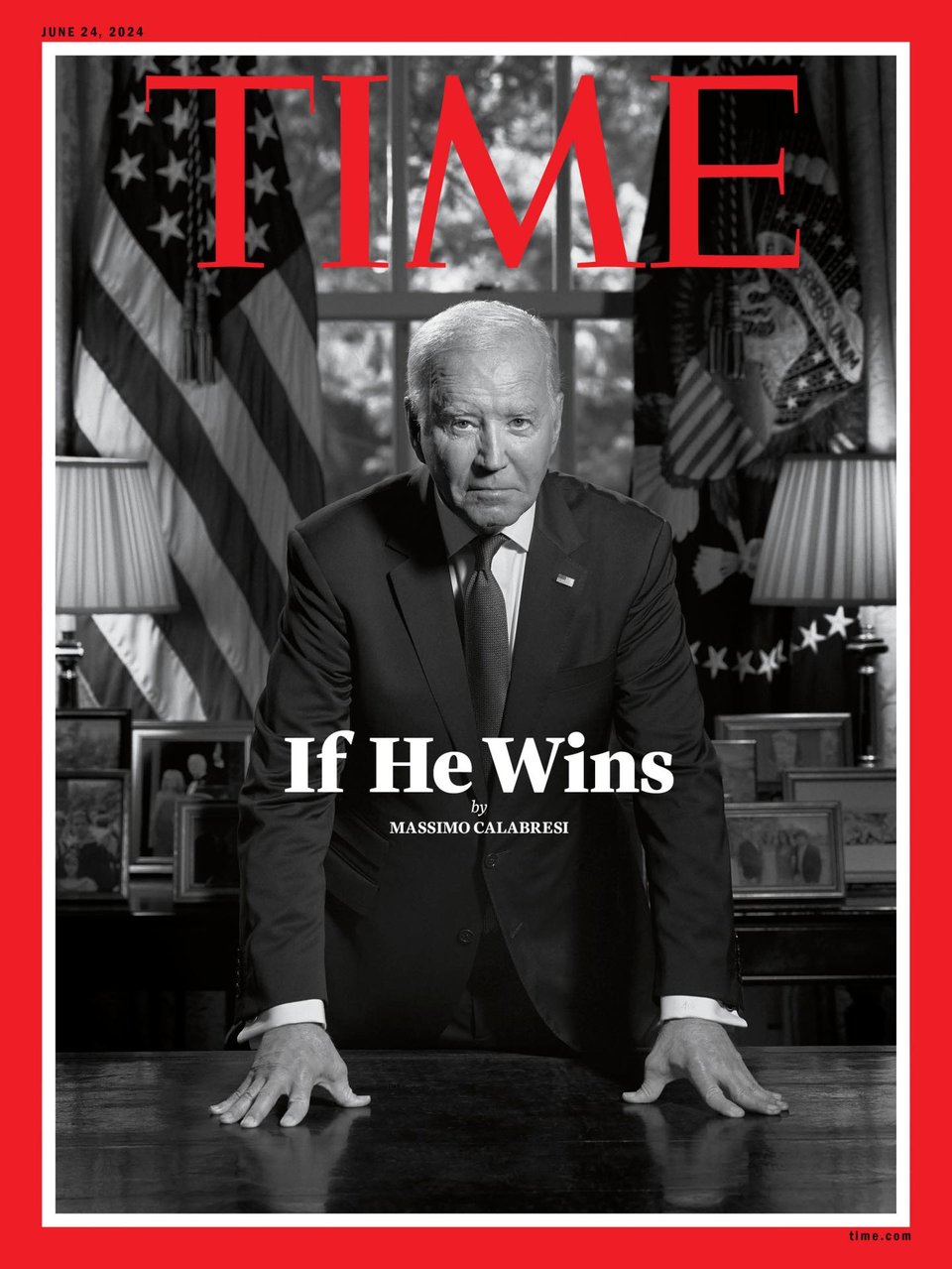
During his 40 months in office, events have tested Biden’s vision of American world leadership. Alliances haven’t been enough to win a new European war in Ukraine. U.S. power and leverage haven’t prevented a humanitarian catastrophe in the Middle East, marked by alleged war crimes. Putin is trying to assemble an axis of autocrats from Tehran to Beijing. In China, the U.S. faces an adversary potentially its equal in economic and military power that is intent on tearing down the American global order. President Xi has told his military to be ready to invade Taiwan by 2027, U.S. officials say, raising the possibility of a dark analogue to Normandy in Asia. Biden doesn’t rule out sending troops to defend Taiwan if China attacked, saying, “It would depend on the circumstances.”
Biden’s record in facing these tests is more than just nostalgic talk. He has added two powerful European militaries to NATO, and will soon announce the doubling of the number of countries in the Atlantic alliance that are paying more than the target 2% of their GDP toward defense, the White House says. His Administration has worked to prevent the war in Gaza from igniting a broader regional conflict. He brokered the first trilateral summit with long-distrustful regional partners South Korea and Japan, and coaxed the Philippines to move away from Beijing’s orbit and provide the U.S. new access to four military bases. He has rallied European and Asian countries to curtail China’s economic sway. “We have put together the strongest alliance in the history of the world,” Biden says, so that “we are able to move in a way that recognizes how much the world has changed and still lead.”
But American Presidents must earn a mandate from their fellow citizens, and it’s far from clear that Biden can. In surveys, large majorities say that he is too old to lead. As he walked TIME through the West Wing and sat for a 35-minute interview on May 28, the President, with his stiff gait, muffled voice, and fitful syntax, cut a striking contrast with the intense, loquacious figure who served as Senator and Vice President. Biden bristles at the suggestion that he is aging out of his job. Asked whether he could handle its rigors though the end of a second term, when he will be 86, he shot back, “I can do it better than anybody you know.” Age aside, Biden’s handling of foreign affairs gets poor marks from voters, and not just for the bungled withdrawal of U.S. forces from Afghanistan or the ongoing war in Gaza. While 65% of Americans still believe that the U.S. should take a leading or major role in the world, that number is down 14 points from 2003 and is at its lowest level since Gallup began polling the issue two years earlier.
Biden, who is the most experienced foreign policy President in a generation, believes that role is in America’s interest. “When we strengthen our alliances, we amplify our power as well as our ability to disrupt threats before they can reach our shores,” he said soon after taking office. To judge the merit of Biden’s plan to sustain American world leadership, voters can look to his record: what he has accomplished, where he has fallen short, and how he intends to build on his work in a second term.
Around 3 p.m. on Dec. 13, 2021, the White House Situation Room put through a call from Biden to his Finnish counterpart, Sauli Niinisto. Putin’s invasion of Ukraine was still more than two months away, and Finland, with its 830-mileborder with Russia and tense history with Moscow, had long declined to join NATO. Less than a quarter of Finns supported entering the alliance at the time. But Biden had decided, aides say, that if Russia invaded, the West’s response should be not just to defend NATO, but to strengthen it.
On March 4, days after the invasion, Biden met with the newly enthusiastic Niinisto in the Oval Office. Together they called Swedish Prime Minister Magdalena Andersson, who had resisted joining the alliance, to try to persuade her. After both countries applied for membership in May 2022, Biden turned to getting the rest of NATO to accept them. In June, he called Turkey’s leader Recep Tayyip Erdogan from Air Force One on the way to a summit in Madrid, in hopes of getting Erdogan’s support for expanding the alliance. Dangling a one-on-one meeting, Biden said of Turkey’s long-sought access to America’s F-16 fighter jets, “Let’s find a way to get that done,” according to the White House. By March 2024, Sweden and Finland were in. “Everybody thought, including you guys, thought I was crazy,” Biden says. “Guess what? I did it.”
Around 3 p.m. on Dec. 13, 2021, the White House Situation Room put through a call from Biden to his Finnish counterpart, Sauli Niinisto. Putin’s invasion of Ukraine was still more than two months away, and Finland, with its 830-mileborder with Russia and tense history with Moscow, had long declined to join NATO. Less than a quarter of Finns supported entering the alliance at the time. But Biden had decided, aides say, that if Russia invaded, the West’s response should be not just to defend NATO, but to strengthen it.
On March 4, days after the invasion, Biden met with the newly enthusiastic Niinisto in the Oval Office. Together they called Swedish Prime Minister Magdalena Andersson, who had resisted joining the alliance, to try to persuade her. After both countries applied for membership in May 2022, Biden turned to getting the rest of NATO to accept them. In June, he called Turkey’s leader Recep Tayyip Erdogan from Air Force One on the way to a summit in Madrid, in hopes of getting Erdogan’s support for expanding the alliance. Dangling a one-on-one meeting, Biden said of Turkey’s long-sought access to America’s F-16 fighter jets, “Let’s find a way to get that done,” according to the White House. By March 2024, Sweden and Finland were in. “Everybody thought, including you guys, thought I was crazy,” Biden says. “Guess what? I did it.”
The accession of Finland and Sweden was part of Biden’s broader efforts to respond to Russia’s invasion of Ukraine by rallying the free world. Starting in October 2021, Biden held a series of meetings with European and NATO leaders, discussing postinvasion support for Ukraine, including military assistance, sanctions, diplomacy, and economic support. Biden also brought Asian allies into the effort. South Korea and Japan have imposed sanctions on Russia and its arms suppliers. The result, Biden advisers say, is a strengthened alliance of shared democratic values worldwide. “He has connected Europe and Asia in a way no previous President has,” says National Security Adviser Jake Sullivan.
Others view all the investment in Ukraine as a distraction from the bigger challenge America faces in East Asia. “Who doesn’t think that $200 billion spent in Europe would’ve been incredibly useful in the Pacific?” says Elbridge Colby, a former Trump Administration Pentagon official and lead architect of the 2018 National Defense Strategy. “Great nations fail,” says Lieut. General Keith Kellogg, Trump’s former National Security Adviser, when “you fix somebody else’s potholes instead of fixing your potholes.”
Biden says he remains committed to Ukrainian victory. Asked about the war’s endgame, Biden says, “Peace looks like making sure Russia never, never, never, never occupies Ukraine.” But last year’s Ukrainian counteroffensive was a failure. Russia recently has made its largest advances since the opening months of the invasion. Alliance building may have reached its limit, along with Americans’ appetite for funding a war of attrition. Biden’s allies in Kyiv complain he has been too cautious, giving Ukraine enough weapons to survive the war but not to win it. “It’s not a decisive stance,” says a senior official in President Volodymyr Zelensky’s government. “It’s not the way to victory.”
On balance, however, even longtime critics are impressed with Biden’s efforts in Ukraine. Former Defense Secretary and CIA director Robert Gates wrote in 2014 that Biden had “been wrong on nearly every major foreign policy and national-security issue over the past four decades.” But on May 19, Gates said that Biden’s response to Russia’s invasion has gone a long way toward repairing the damage of the disastrous Afghanistan withdrawal. “He gained a lot of credibility with the speed with which he assembled the coalition of partner countries, allies, and friends before, during, and after the Russian invasion of Ukraine,” Gates told CBS’s Face the Nation.
Biden says his response has been part of a broader deterrence strategy. “If we ever let Ukraine go down, mark my words, you’ll see Poland go, and you’ll see all those nations along the actual border of Russia [fall],” he tells TIME. But in other theaters, the high-minded Normandy vision has given way to a different kind of diplomacy.
Halfway through our interview, Biden responds to a question about America’s relationship with Saudi Arabia by saying that the U.S. has two kinds of alliances: “There are values-based, and there are practical-based.” During the campaign, Biden had sworn to make Saudi Arabia a “pariah.” One of his first moves in office was to cut off certain arms supplies over the kingdom’s war in Yemen, which has displaced 4.5 million people and killed 377,000, including 11,000 children, according to the U.N. Soon after, the de facto Saudi ruler, Crown Prince Mohammed bin Salman, known as MBS, met with China’s Foreign Minister and proposed greater cooperation on nuclear energy and security with Beijing, already the kingdom’s largest economic partner.
The Biden Administration quietly pivoted. A new “great game” was afoot, with the world dividing between competing Chinese and American spheres of influence. For all Biden’s efforts to stimulate a green transition, Saudi Arabia was still providing much of the world’s energy. Moreover, the Saudis had expressed willingness during the Trump presidency to normalize relations with Israel, which would tilt the regional balance of power against Iran and in the U.S.’s favor. On Sept. 27, 2021, Sullivan traveled to Saudi Arabia with instructions from Biden to explore the possibility of a peace deal between the kingdom and Israel.
The Biden Administration quietly pivoted. A new “great game” was afoot, with the world dividing between competing Chinese and American spheres of influence. For all Biden’s efforts to stimulate a green transition, Saudi Arabia was still providing much of the world’s energy. Moreover, the Saudis had expressed willingness during the Trump presidency to normalize relations with Israel, which would tilt the regional balance of power against Iran and in the U.S.’s favor. On Sept. 27, 2021, Sullivan traveled to Saudi Arabia with instructions from Biden to explore the possibility of a peace deal between the kingdom and Israel.
Biden himself traveled to Saudi Arabia in July 2022, bucking a flurry of criticism for meeting with MBS, who has led a widespread crackdown on clerics, academics, and human-rights advocates critical of his regime, according to Human Rights Watch, and who the U.S. says ordered the murder of Washington Post journalist Jamal Khashoggi. But the visit helped stabilize relations. Over the course of the next year, it began to look as if Biden’s moral climb down with MBS had brought the Saudis back on the U.S. side, and restarted a possible bargain with Israel. The outlines of that deal, Biden now says, were “overwhelmingly in our interest.”
Hamas, the terrorist group that controls Gaza, was determined not to allow it. Days after its Oct. 7 attack against Israel, which killed some 1,200 people, Hamas spokesman Ghazi Hamad told TIME, “We planned for this because Israel thinks it can make peace with anyone, it can make normalization with any country, it can oppress the Palestinians, so we decided to shock the Israelis in order to wake up others.” Eight Americans were among the estimated 240 taken hostage in the massacre. The Biden Administration has sought to secure their release, but it is not clear how many of the American hostages have survived; three reportedly have been killed. “We believe there are those that are still alive,” Biden tells TIME. “I met with all the families. But we don’t have final proof on exactly who’s alive.”
Biden’s reaction to Oct. 7 was to provide rock-solid support to Israel. Within a week he had deployed two aircraft carriers to the region. Quietly, he tried to rally Egypt and Saudi Arabia to resist expansion of the conflict into a war between Israel and Iran. Biden’s “practical-based” alliance building appeared to pay off on April 13, when Iran responded to an Israeli attack on a satellite diplomatic office by launching more than 300 missiles and drones in its first-ever direct attack on Israel. The Saudis and Jordanians reportedly provided intelligence assistance and opened their airspace to U.S. and other jets. With Israel leading the way, the ad hoc alliance managed to shoot down all but four of the projectiles, with no fatalities. More important, the episode helped avert a region-wide war.
But Prime Minister Benjamin Netanyahu has upped the cost of Biden’s commitment to Israel at every turn. Nearly eight months after the conflict started, the death toll in Gaza, according to the local Hamas-led Ministry of Health, has climbed to more than 36,000 people, including an unknown number of Hamas fighters. More than 1.7 million have been displaced by Israeli attacks that have destroyed much of the enclave. On May 20, the prosecutor for the International Criminal Court requested a war-crimes indictment for Netanyahu, his Defense Minister, and three leaders of Hamas. Four days later, in a largely symbolic move, the International Court of Justice ordered Israel to halt operations in Gaza. Human Rights Watch says Israel has “imposed collective punishments on the civilian population, deprived the civilian population of objects indispensable to its survival, and used starvation of civilians as a weapon of war.”
Asked if Israeli forces have committed war crimes in Gaza, Biden says, “It’s uncertain.” From the start, the Administration knew Israel was pushing the limits of legal warfare, the Washington Post and others have reported. The conflict is driving a wedge between the U.S. and its allies. On May 31, Biden laid out a phased cease-fire plan that would end the war and secure the release of hostages. He has continued to pursue the complicated regional deal with Saudi Arabia. Some close to Biden say the only holdout to the broader pact is Netanyahu. The President declines to say as much, but when asked by TIME if Netanyahu is prolonging the war for his own political reasons, Biden admits, “There is every reason for people to draw that conclusion.”
As aides try to bring the interview to a close, Biden turns to China. Hawks say Beijing is in a sprint to match American economic and military production. By some measures, it is catching up on GDP and defense manufacturing, and already has a larger navy. But Biden takes a bullish view of the competition with the rising Asian power. “Everybody talks about how, how strong China is and how powerful they are,” Biden says. “You’ve got an economy that’s on the brink there. The idea that their economy is booming, give me a break.” That doesn’t mean they can’t pose a threat. Asked if China is using AI or other means to meddle in the upcoming U.S. election, Biden says someone is, but declines to say who. Pressed, he adds, “I think China would have an interest in meddling.”
What Biden describes as China’s economic weakness could make confrontation more, not less, likely—another argument, as he sees it, for expanding America’s alliances in East Asia. And in that arena, the President has pursued a mix of “values-based” and “practical” approaches.
Biden was on Air Force One on his way to a fundraiser in Illinois on May 11, 2022, when the results of the Philippine presidential elections were announced, showing that Ferdinand “Bongbong” Marcos Jr. had won. Biden “had the instinct to just pick up the phone and said, ‘Hey, let’s get together soon and start building a relationship,’” Sullivan says. It was a long shot. Marcos has a pending $2 billion judgment against him in a U.S. court relating to his parents’ human-rights record during their more than 20-year dictatorship, which ended in 1986. The Philippines are now rated “partly free” by Freedom House, and the outgoing President, Rodrigo Duterte, had courted China even as Beijing claimed nearby islands and territorial waters. Marcos had sent cold signals to the U.S. during his campaign.
Biden’s call was the first Marcos had received from a foreign leader. As U.S. officials followed up, they briefed the new President on the parallels between Putin’s invasion of Ukraine and Xi’s declared goals in the South China Sea. Biden dispatched Vice President Kamala Harris and his Secretaries of State and Defense to woo Marcos. Deputy Secretary of State Wendy Sherman made clear Marcos had diplomatic immunity and would be welcome in the U.S. Less than a year after Biden’s congratulatory call, Marcos made a visit to the White House. More significantly, he provided the U.S. military new access to four bases in the Philippines. In April and May, the two countries engaged in their largest military exercises together, simulating an effort to repulse an amphibious landing. “The President got engaged early in a very personal way,” says Sullivan, “and then kind of showed both respect for him and a vision for where the relationship would go.”
Biden has pursued this brand of personal realpolitik across Asia. He elevated the communist autocracy in Vietnam to the highest diplomatic status, comprehensive strategic partner, and has moved to embrace the increasingly repressive regime of Narendra Modi in India. He has tried to boost the “Quad” alliance with India, Japan, and Australia, upgrading it from a meeting of Foreign Ministers to one of heads of state. In April 2023, Biden convened a Camp David summit with the South Korean President Yoon Suk-yeol and Japanese Prime Minister Fumio Kishida. Overcoming long-fraught relations between Seoul and Tokyo, the three countries criticized China’s behavior in the South China Sea and declared “a hinge point of history, when geopolitical competition, the climate crisis, Russia’s war of aggression against Ukraine, and nuclear provocations test us.”
Critics say the problem is too much friend making and not enough deterrence. The U.K. recently said China may be preparing to provide lethal aid to Russia, a move that Biden said in March 2022 would put Xi “in significant jeopardy” of harsh U.S. sanctions. “The single biggest problem with the Biden team is their failure to grasp what it takes to achieve effective deterrence against aggressors,” says Matt Pottinger, who was Deputy National Security Adviser under Trump. “They failed against the Taliban, then Putin, and then Iran and its proxies. And now Beijing is making moves that could prove fateful for the world.” Former Trump official Colby says Biden’s diplomatic work is a weak substitute for the one thing that can deter China’s rise. “These high-profile photo ops,” says Colby, “are not a substitute for raw military power.” He points to recent statements by senior U.S. military officials that China is outpacing the U.S. on missile- and shipbuilding, and war games showing the U.S. losing badly in a contest over Taiwan, and says the U.S. should put all its efforts into defending the “first island chain” of Japan, Taiwan, and the Philippines.
Biden believes that withdrawing from Europe and the Middle East to focus on East Asia would backfire, aides say. If America abandons its allies elsewhere, they argue, its Asian allies will abandon it, in turn. The U.S. needs European and Middle Eastern countries to increase its economic and military advantages over China. And ultimately, failing to confront instability now—in Ukraine, Gaza or elsewhere—will only make doing so later a more costly distraction from the competition with Beijing.
Back in the Cabinet Room after the interview, the sun is lower, and Biden has more stories. He turns to a sideboard with a commendation from the Kosovo government to his son Beau Biden, who died of cancer nine years ago. The President relates with evident pride his son’s work supporting its judicial system. A mention of diplomat Richard Holbrooke, who brokered the Dayton accords for the Balkans, elicits a story about Afghanistan and an argument Biden had with Holbrooke over the search for peace there.
On a matching sideboard on the other side of the door, the President opens an album with travel pictures, launching a series of anecdotes about the Popes he has known, including John Paul II and Benedict, whom Biden calls “the Rottweiler.” Recounting an exchange with one over abortion, he casts an eye toward the cracked door to the Oval Office and asks an aide, “Are they in there?” Turning back to his visitors, he says, “Let me show you one more picture.”
This avuncular politicking remains a Biden trademark, one that has helped with allies overseas but failed to unite Americans at home, as Biden pledged when running for President. Not that he has stopped trying. Biden ultimately persuaded Republican House Speaker Mike Johnson to move a roughly $95 billion supplemental aid package for Ukraine, the Middle East, and Taiwan. To build support for his Middle East peace package, he has worked both sides of the aisle. On Nov. 8, 2023, Biden sat for two hours in the windowless Roosevelt Room with a bipartisan group of nine Senators who had just returned from the region, asking for impressions from the trip and moderating a conversation between them, Sullivan, and Middle East coordinator Brett McGurk. At the end, he pulled Democratic Senator Chris Coons and Republican Senator Lindsey Graham into the Oval Office for separate 10-minute conversations about next steps in the effort, says Coons.
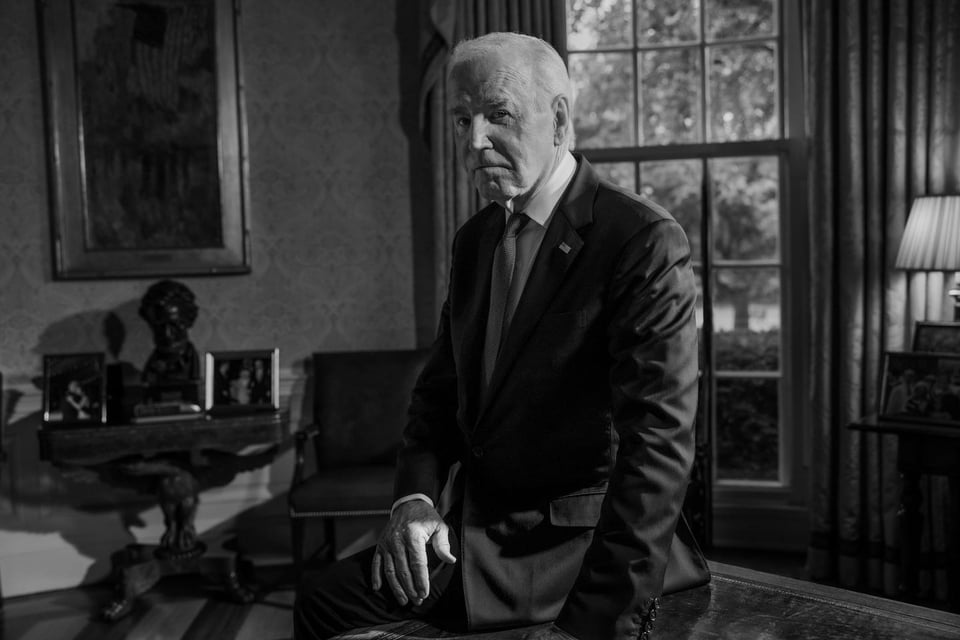
Biden may be right that despite the partisanship, a consensus exists for a values-based, pragmatic role for America in the world. His challenge is to get Americans to focus on that rather than on other issues driven by foreign affairs, like inflation or immigration. Biden denies that his expansion of Trump’s trade war with China will increase prices, and says his only regret about lifting Trump’s anti-immigration measures is that he didn’t do it sooner. His goal in a second term, he says, is “to finish what he started.”
stake is the direction of the world for the coming century. At Normandy, Biden will make the case for what historian Hal Brands says is “the 80-year tradition of internationalism that has been quite good for America and the world.” The alternative, says Brands, would be a “more vicious and chaotic” world where Americans ultimately would be less safe, prosperous, and free, but only after everyone else suffered first.
Wrapping up his conversation with TIME, Biden offers cookies from a tray in the outer Oval. “They’re homemade,” he says. Turning to leave, he offers a final salutation: “Keep the faith.” But then he pauses and turns back, as the phrase triggers one last story. It’s about a relative who had his own response to that admonition. And here Biden taps one of his visitors on the chest and says, “Spread the faith.”
— - -
President Biden is in France to celebrate the 80th Anniversary of D-Day.
The Washington Post reports- PARIS — President Biden arrived in France on Wednesday to join world leaders in commemorating the 80th anniversary of D-Day, a visit in which he plans to evoke the memory of allies united against tyranny to highlight the stakes of his election campaign and draw a pointed comparison with Donald Trump.
The theme of this week’s ceremonies — a brotherhood of nations united in sacrifice to beat back authoritarianism — is one that is factoring into European Parliament elections this week, as well as Biden’s message in his campaign against Trump. The Biden campaign argues that the former president, who groundlessly denies his 2020 loss, is a would-be authoritarian who would end American democracy if he prevails.
The contrast with Trump is likely to remain largely unspoken, but it will be hard to miss. Biden has regularly cited reports that the former president, during a visit to France when he occupied the White House, was reluctant to honor American service members buried at a French cemetery and reportedly called fallen soldiers “suckers” and “losers.”

_________________________________________________
The MAGA House is more and more out of control.
Mike Johnson appoints two Trump allies to a committee that handles classified intelligence.
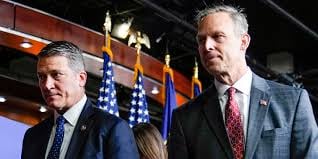
Extremists Ronny Johnson (left) and Scott Perry were empowered by Mike Johnson.
WASHINGTON (AP) — House Speaker Mike Johnson on Wednesday appointed two far-right Republicans to the powerful House Intelligence Committee, positioning two close allies of Donald Trump who worked to overturn the 2020 presidential election on a panel that receives sensitive classified briefings and oversees the work of America’s spy agencies.
The appointments of GOP Reps. Scott Perry of Pennsylvania and Ronny Jackson of Texas to the House Intelligence Committee were announced on the House floor Wednesday. Johnson, a hardline conservative from Louisiana who has aligned himself with Trump, was replacing spots on the committee that opened up after the resignations of Republican Reps. Mike Gallagher of Wisconsin and Chris Stewart of Utah.
Committee spots have typically been given to lawmakers with backgrounds in national security and who have gained respect across the aisle. But the replacements with two close Trump allies comes as Johnson has signaled his willingness to use the full force of the House to aid Trump’s bid to reclaim the Oval Office. It also hands the hard-right faction of the House two coveted spots on a committee that handles the nation’s secrets and holds tremendous influence over the direction of foreign policy. (Associated Press).
_________________________________________________
Justice is now at a standstill. 👇
Alvin Bragg’s case was the only one which moved forward.
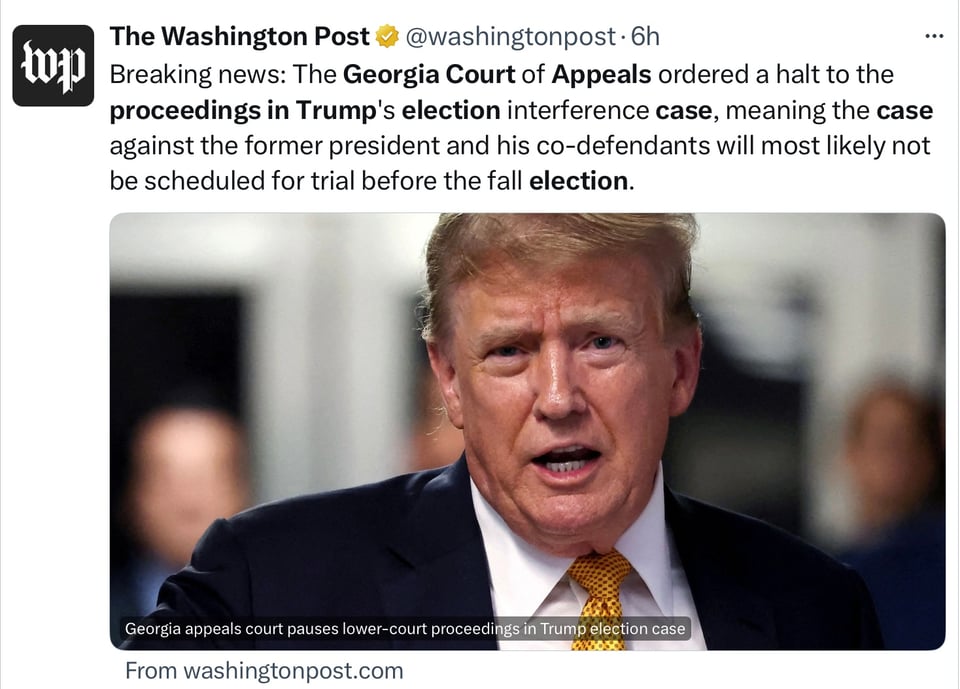
_________________________________________________
Two different sides. One battle.
The fight against fairness goes on.
U.S. appeals court blocks grant program for Black women-owned businesses
Venture capital fund Fearless Fund cannot resume making grants to Black women-owned businesses, a divided U.S. appeals court ruled on Monday, siding with an anti-affirmative action group that sued over the program.
The Atlanta-based 11th U.S. Circuit Court of Appeals found that the group’s discrimination lawsuit was likely to succeed, reversing a judge’s decision that the program should be allowed to continue while the case moves forward.
The ruling is a victory for Edward Blum, the conservative activist behind the successful U.S. Supreme Court challengeto race-conscious college admissions policies.
Blum’s group American Alliance for Equal Rights last year alleged the Fearless Fund was violating a 19th century federal law that bars racial bias in private contracts.
The lawsuit targeted a Fearless Fund program that awards Black women who own small businesses $20,000 in grants and other resources to grow their businesses.

Businesses owned by Black women [the fastest-growing group of entrepreneurs, new research from GoDaddy has found ] in 2022 received less than 1% of the $288 billion that venture capital firms deployed, according to the Fearless Fund.
The 11th Circuit panel, led by Circuit Judge Kevin Newsom, an appointee of former Republican U.S. President Donald Trump, concluded that Fearless Fund’s program did not warrant speech protections under the U.S. Constitution’s First Amendment.
Another Trump appointee, Robert Luck, joined Newsom’s order. Circuit Judge Robin Rosenbaum, an Obama-era appointee, dissented, accusing the plaintiffs of pretending to be harmed by the program. The grant initiative had been on hold following an earlier decision from the appeals court.
Attorneys for Fearless Fund in a statement said Monday’s ruling contradicted more than 150 years of civil rights law. They said the decision “is not the final outcome in this case.”
Fearless Fund had argued to the court in January that it had a constitutional right to express its belief in the importance of Black women to the economy through charity.
Blum in a statement on Monday said federal “civil rights laws do not permit racial distinctions because some groups are overrepresented in various endeavors, while others are under-represented.” (CNBC)
The fight for fairness goes on.
The Commissioner’s Cup’s Impact on Social Justice in the W.
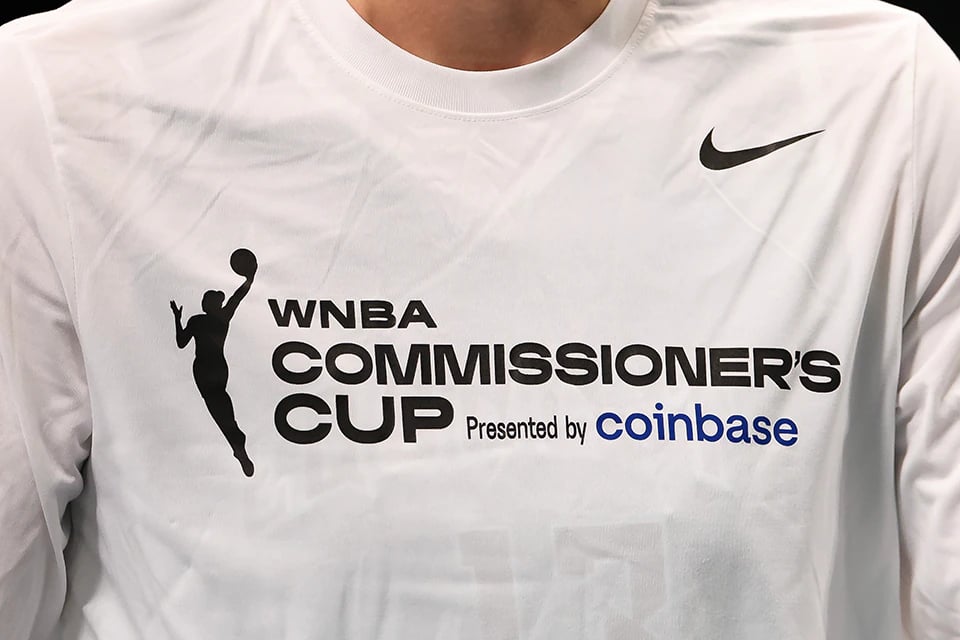
This season marks the fourth Commissioner’s Cup Presented by Coinbase, the WNBA’s in-season tournament. It checks off several boxes: it raises the stakes of regular-season play, brings in new media and corporate sponsors, and creates more compensation for players who make it to the championship game with a $500,000 prize pool. Additionally, Coinbase has committed an additional $120,000 in cryptocurrency to the prize pool, which includes $5,000 for each player in the championship game.
The Commissioner’s Cup Presented by Coinbase also aims to spotlight the league’s social justice efforts. Bethany Donaphin, head of WNBA league operations, says the League is rooted in bold advocacy, so it was a no-brainer to include it in the platform we built for the Commissioner’s Cup.
“The WNBA has long been recognized as the most progressive league in professional sports, and it’s one that continually shows up as a leader in the social justice space,” Donaphin said. “So, really, why wouldn’t we use one of our marquee league events to address important social issues?”
The league prioritizes a player-led agenda in collaboration with the Women’s National Basketball Player’s Association (WNBPA). This season, the focus will be on civic engagement and reproductive health advocacy.
The Commissioner’s Cup has the opportunity to impact the communities where the games are being played. The 2024 Commissioner’s Cup presented by Coinbase will spotlight this season’s priorities.
It wouldn’t be the first time WNBA players used their platforms to showcase the power of voting. Most recently, and notably, in 2020 when players publicly advocated for a candidate in the Georgia senate run-off race. But with a significant presidential election on the horizon, the League’s ongoing partnership with Rock the Vote, a nonpartisan nonprofit, will tap into WNBA fans and focus on building the political power of young people through voter registration, education, and mobilization.
“Rock the Vote is thrilled to join forces with the WNBA and WNBPA to empower fans and drive voter engagement ahead of the 2024 election,” said Carolyn DeWitt, president of Rock the Vote, in a statement. “By harnessing the dedication of WNBA players and their supporters, we can inspire meaningful participation in our democracy and shape our collective future.”
Los Angeles Sparks guard Layshia Clarendon added that the Commissioner’s Cup is a way to spotlight initiatives that the players care about. The league accumulates donations for each team in Commissioner’s Cup-tagged games for hand-picked non-profit organizations specific to their markets. This puts organizations in the day-to-day community work at the center, allowing the League to localize its efforts.
“We’re not only basketball players,” Clarendon said. “We’re always thinking of ways we can be civically engaged and impact our community.”
In 2020, the WNBA and WNBPA formed the Social Justice Council to be the driving force of timely and important societal issues. This season’s council is led by Clarendon, along with the Sun’s DeWanna Bonner, Aces’ Alysha Clark, Liberty’s Breanna Stewart, and Sky’s Brianna Turner.
“We’re a social justice league because we, frankly, kind of have to be,” said Clarendon. “We’re a league of predominantly Black women who have been at the intersections of race and gender. We inherently have to think about things like ‘double time’ and the way we move through the world.”
“Double time” or “double jeopardy” is a phrase coined to underline the multiple oppressions—race, class, and gender—Black women have to face simultaneously.
Clarendon continues: “One of the ways we can continue to impact, particularly around this election cycle, around voting, and something that the Social Justice Council is focusing on is reproductive rights and right over bodily autonomy.”
The Commissioner’s Cup presented by Coinbase championship game will be held on June 25, one day after the second anniversary of the Supreme Court’s overruling of Roe v. Wade, the landmark Court case that constitutionally protected the right to have an abortion — an overturn that Clarendon thought would never happen in their lifetime. Even the championship game proves it’ll be about more than just hoops.
“That’s something that we’re fighting with a sense of urgency. We’re seeing what’s happening in various states,” Clarendon added. “We think we can use our voice and drive people to the election this year and say, ‘Look, we need to vote because our rights are on the line…Our ability to have bodily autonomy is on the ballot this November.’”
As more eyes fixate on the WNBA’s on-court prowess, Clarendon and Donaphin hope the League’s long resumé of social justice comes into focus right along with it.
“For the new fan, welcome to the most dynamic league in the world with the most dynamic players, who do a little bit of everything, with also an amazing product on the court,” said Clarendon.
More eyes mean more opportunities to highlight what matters. As Donaphin puts it, “As we grow, we hope that our impact in these important areas of our society can grow, too.” (WNBA app).
_________________________________________________
Your daily reminder.
Trump is still a felon.
Heather Cox Richardson - “The fallout from the New York jury’s conviction of Donald Trump on 34 felony counts last Thursday, May 30, continues. Trump’s team continues to insist that the guilty verdict will help him, but that’s nonsensical on its face: if guilty verdicts are so helpful, why has he moved heaven and earth to keep the many other cases against him from going to trial? And why are he and House speaker Mike Johnson (R-LA) calling for the Supreme Court to overturn the convictions?”
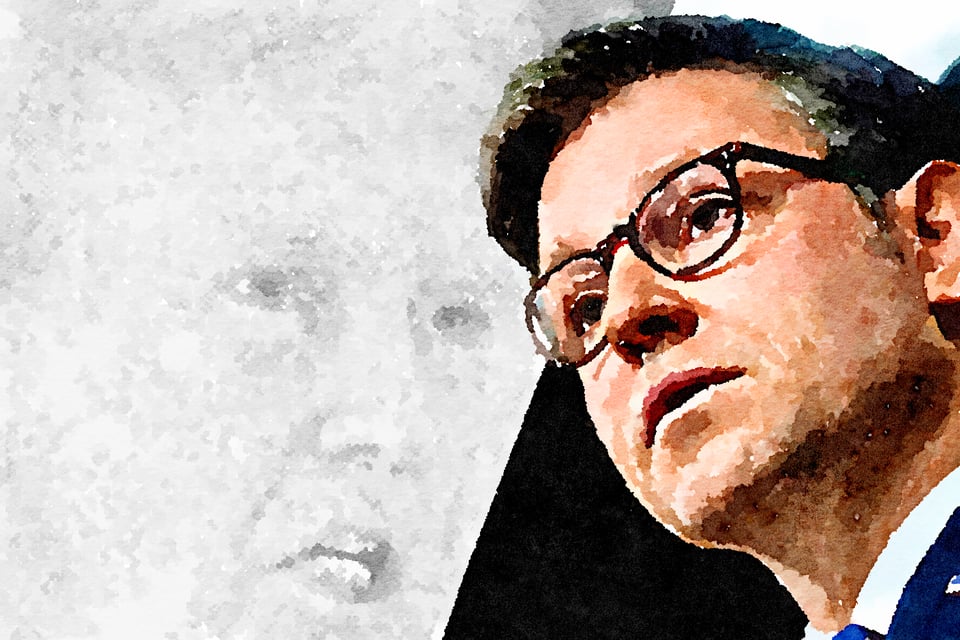
On May 30th, he was found guilty on 34 felony counts by the unanimous vote of 12 ordinary citizens.
He will be sentenced on July 11th.
_________________________________________________